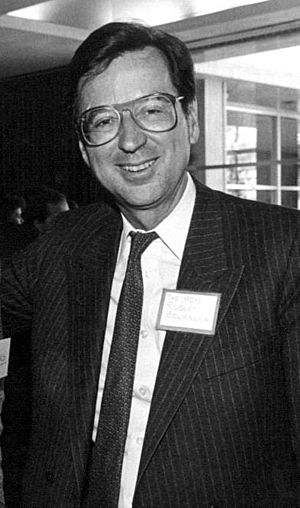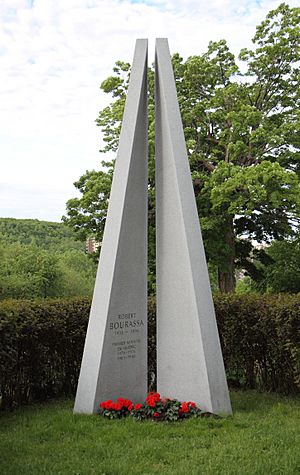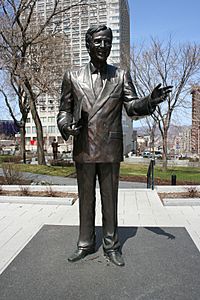Robert Bourassa facts for kids
Quick facts for kids
Robert Bourassa
|
|
|---|---|
 |
|
| 22nd Premier of Quebec | |
| In office May 12, 1970 – November 25, 1976 |
|
| Monarch | Elizabeth II |
| Lieutenant Governor | Hugues Lapointe |
| Deputy | Pierre Laporte (1970) |
| Preceded by | Jean-Jacques Bertrand |
| Succeeded by | René Lévesque |
| In office December 12, 1985 – January 11, 1994 |
|
| Monarch | Elizabeth II |
| Lieutenant Governor | Gilles Lamontagne Martial Asselin |
| Deputy | Lise Bacon |
| Preceded by | Pierre-Marc Johnson |
| Succeeded by | Daniel Johnson Jr. |
| MNA for Saint-Laurent | |
| In office January 20, 1986 – January 11, 1994 |
|
| Preceded by | Germain Leduc |
| Succeeded by | Normand Cherry |
| MNA for Mercier | |
| In office June 5, 1966 – November 25, 1976 |
|
| Preceded by | District created |
| Succeeded by | Gérald Godin |
| MNA for Bertrand | |
| In office June 3, 1985 – December 2, 1985 |
|
| Preceded by | Denis Lazure |
| Succeeded by | Jean-Guy Parent |
| Personal details | |
| Born |
Jean-Robert Bourassa
July 14, 1933 Montreal, Quebec, Canada |
| Died | October 2, 1996 (aged 63) Montreal, Quebec, Canada |
| Resting place | Notre Dame des Neiges Cemetery |
| Political party | Quebec Liberal Party |
| Spouse |
Andrée Simard
(m. 1958) |
| Alma mater |
|
| Profession |
|
Robert Bourassa (July 14, 1933 – October 2, 1996) was a Canadian lawyer and politician. He served as the 22nd premier of Quebec for two terms. His first term was from 1970 to 1976, and his second from 1985 to 1994.
As a member of the Quebec Liberal Party, he was premier for almost 15 years. Important events during his time included the October Crisis and discussions about the Canadian Constitution. These talks involved the Meech Lake Accord and the Charlottetown Accord.
Contents
Early Life and Education
Robert Bourassa was born in Montreal to a working-class family. His father, Aubert Bourassa, worked at the port.
He studied law at the Université de Montréal and became a lawyer in 1957. In 1958, he married Andrée Simard. She came from a powerful family known for shipbuilding.
Bourassa continued his studies at Keble College, University of Oxford, and Harvard University. He earned a degree in political economy from Harvard in 1960. After returning to Quebec, he worked as a financial advisor. He also taught public finance at universities.
Starting His Political Career
Bourassa first became a member of the Legislative Assembly of Quebec (MLA) in 1966. He represented the area of Mercier.
In 1970, he won the leadership election for the Quebec Liberal Party. He was seen as a young and skilled leader. His main promise was to create "100,000 jobs." He believed that Quebec's large hydroelectric resources could help modernize the province and create many jobs.
He led his party to victory in the 1970 Quebec general election. He defeated the Union Nationale government. At 36, he became the youngest premier in Quebec's history.
Premier of Quebec (1970-1976)
The October Crisis
One of Bourassa's first big challenges was the October Crisis in 1970. During this time, his deputy, Pierre Laporte, was kidnapped by the Front de libération du Quebec (FLQ).
Bourassa asked Prime Minister Pierre Trudeau to use the War Measures Act. This law allowed police to search and arrest people connected to the FLQ. Troops were also sent to Montreal to protect important places and help the police. The troops left in January 1971.
Language and Identity
Bourassa and Trudeau often disagreed on how Quebec fit into Canada. Trudeau did not like what he saw as Quebec wanting more independence. In 1971, Bourassa tried to reform the Canadian Constitution with the Victoria Charter. However, he withdrew his support after Quebec leaders criticized it. They felt it did not give Quebec enough power.
In 1974, Bourassa introduced Bill 22. This law made French the only official language of Quebec. This meant Quebec was no longer officially bilingual (French and English). However, the rights of English speakers were still protected. This law made some English speakers angry. Many French speakers felt it did not go far enough.
Big Projects and Challenges
Bourassa started the James Bay Project in 1971. This huge project built hydroelectric dams. It led to an agreement in 1975 with the Cree and Inuit people of the region.
His government also helped save the 1976 Summer Olympics in Montreal. The Olympics faced huge cost problems and construction delays.
In 1976, Bourassa lost the 1976 Quebec general election to René Lévesque. Lévesque was the leader of the Parti Québécois, which wanted Quebec to be independent. Bourassa lost his own seat and resigned as Liberal Party leader. He then took teaching jobs outside of Quebec.
Away from Politics (1976–1985)
Bourassa spent nine years outside of active politics. He lived overseas for some time. In 1980, he supported the "no" side in the 1980 Quebec referendum. This referendum was about Quebec becoming more independent from Canada. The "no" side won.
In 1983, Bourassa was elected leader of the Quebec Liberal Party again.
Premier of Quebec (1985–1994)
Bourassa led the Liberal Party to win the 1985 Quebec general election. However, he lost his own seat in that election. In 1986, he won a special election in the area of Saint-Laurent.
Language and the Constitution
In 1988, Bourassa used the notwithstanding clause. This allowed him to override a court ruling about the French Language Charter. Some of his English-speaking ministers resigned because of this. Later, in 1993, he made changes to the language law. These changes helped reduce the arguments over language in Quebec.
Bourassa wanted Quebec to be recognized as a "distinct society" in the Canadian Constitution. He worked with Prime Minister Brian Mulroney to achieve this. This led to the Meech Lake Accord in 1987 and the Charlottetown Accord in 1992.
The Meech Lake Accord failed in 1990. Two provinces, Manitoba and Newfoundland, did not approve it. This failure made the Quebec independence movement stronger. The Charlottetown Accord was rejected by voters across Canada in 1992. Many in Quebec also voted against it. They felt Bourassa had given up too much in the negotiations.
Oka Crisis
During the Oka Crisis in 1990, Bourassa again asked for the Canadian Armed Forces to help the police. This was the second time he used the National Defence Act.
Later Years and Legacy
Bourassa left politics in 1994. Daniel Johnson Jr. replaced him as Liberal leader and premier.
In 1996, Robert Bourassa passed away in Montreal at age 63 from cancer. He was buried in the Notre Dame des Neiges Cemetery in Montreal.
Famous Quotes
- "No matter what anyone says and no matter what anyone does, Quebec is, today and forever, a distinct society, free and capable of assuming its destiny and development."
- "We all have the means to be prosperous. We have to find the balance between our wealth and our needs."
Honors and Memorials
- A statue of Bourassa was unveiled in front of the National Assembly in Quebec City in 2006.
- A major road in Quebec City, Highway Du Vallon, was renamed after Bourassa in 2006.
- In Montreal, a part of Rue University was renamed Boulevard Robert-Bourassa.
- Canada's largest hydroelectric power station, Robert-Bourassa generating station, and its reservoir, Robert-Bourassa Reservoir, are named after him. This honors his support for the James Bay Project.
Images for kids
See also
 In Spanish: Robert Bourassa para niños
In Spanish: Robert Bourassa para niños
- Politics of Quebec
- List of Quebec Premiers
- Quebec general elections
- Timeline of Quebec history
- Robert-Bourassa generating station and reservoir
 | Leon Lynch |
 | Milton P. Webster |
 | Ferdinand Smith |






